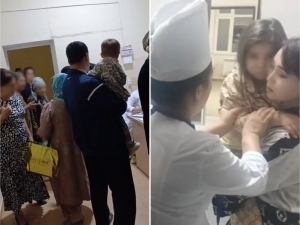Copyright qalampir

Earlier, it was reported that children enrolled in preschool institutions in the Piskent, Buka, Akkurgan, and Lower Chirchik districts of the Tashkent region suffered mass poisoning. Following the incident, the Children’s Ombudsman released the initial results of an investigation. According to the statement, cases of mass poisoning in educational institutions will be placed under special monitoring and studied within the framework of safeguarding children’s right to health. The findings indicate that failure to comply with legislative requirements and established standards for food safety, as well as the lack of an effective control mechanism in this area, has led to situations where children’s health has been harmed. The negative situation that occurred in several districts of the Tashkent region’s preschool institutions clearly illustrates this problem. ’’It is essential that the investigative authorities provide a full legal assessment of the situation and that all those responsible are held strictly accountable within the framework of the law. At the same time, to prevent such unfortunate incidents, particularly to ensure the safety of children’s nutrition in educational institutions, strict quality control must be established over compliance with the standards regulating this sector,’’ the statement said. According to the statement, such a quality control mechanism should be implemented through the constant monitoring of services related to children’s nutrition. In particular, it is necessary to ensure continuous oversight of whether outsourcing companies providing these services comply with sanitary rules, hygiene standards, and other requirements, as well as whether the food products supplied meet established safety standards. It was also emphasized that in concluding contracts for services related to children’s nutrition, it is essential to minimize the human factor in order to eliminate corruption risks. Another important preventive measure is the introduction of a strict mechanism that would prohibit entities found guilty of supplying low-quality food products for children from engaging in such activities again. The Children’s Ombudsman will submit the findings of the study on problems in the field of children’s food safety, along with recommendations for their elimination, to the relevant authorities. It is worth noting that following this incident, the Investigation Department under the Tashkent Regional Police launched a criminal case under Article 257-1, Part 1 of the Criminal Code (violation of sanitary legislation or anti-epidemic rules), and preliminary investigative actions have begun. According to initial assumptions, the deterioration of children’s health may have been caused by low-quality dairy products. It was established that the 3.2% kefir supplied to preschool institutions on the day of the incident had been produced at one of the workshops in the Akkurgan district. According to Nurmat Otabekov, First Deputy Chairman of the Sanitary and Epidemiological Welfare and Public Health Committee, a total of 1,922 children, including those who had contact with the affected patients, underwent medical examinations. Of these, 959 showed no clinical symptoms and were immediately discharged home. In addition, 269 children were sent home after receiving treatment. At present, 694 children remain under medical care in hospitals across the Tashkent region. Experts noted that 13 of them are in moderately serious condition.



